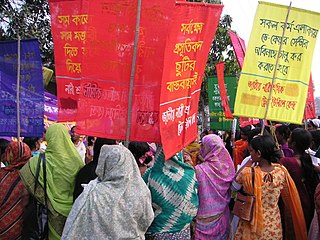Related Research Articles
Labour laws, labour code or employment laws are those that mediate the relationship between workers, employing entities, trade unions, and the government. Collective labour law relates to the tripartite relationship between employee, employer, and union.
Collective bargaining is a process of negotiation between employers and a group of employees aimed at agreements to regulate working salaries, working conditions, benefits, and other aspects of workers' compensation and rights for workers. The interests of the employees are commonly presented by representatives of a trade union to which the employees belong. A collective agreement reached by these negotiations functions as a labour contract between an employer and one or more unions, and typically establishes terms regarding wage scales, working hours, training, health and safety, overtime, grievance mechanisms, and rights to participate in workplace or company affairs. Such agreements can also include 'productivity bargaining' in which workers agree to changes to working practices in return for higher pay or greater job security.

United Kingdom labour law regulates the relations between workers, employers and trade unions. People at work in the UK have a minimum set of employment rights, from Acts of Parliament, Regulations, common law and equity. This includes the right to a minimum wage of £11.44 for over-23-year-olds from April 2023 under the National Minimum Wage Act 1998. The Working Time Regulations 1998 give the right to 28 days paid holidays, breaks from work, and attempt to limit long working hours. The Employment Rights Act 1996 gives the right to leave for child care, and the right to request flexible working patterns. The Pensions Act 2008 gives the right to be automatically enrolled in a basic occupational pension, whose funds must be protected according to the Pensions Act 1995. Workers must be able to vote for trustees of their occupational pensions under the Pensions Act 2004. In some enterprises, such as universities or NHS foundation trusts, staff can vote for the directors of the organisation. In enterprises with over 50 staff, workers must be negotiated with, with a view to agreement on any contract or workplace organisation changes, major economic developments or difficulties. The UK Corporate Governance Code recommends worker involvement in voting for a listed company's board of directors but does not yet follow international standards in protecting the right to vote in law. Collective bargaining, between democratically organised trade unions and the enterprise's management, has been seen as a "single channel" for individual workers to counteract the employer's abuse of power when it dismisses staff or fix the terms of work. Collective agreements are ultimately backed up by a trade union's right to strike: a fundamental requirement of democratic society in international law. Under the Trade Union and Labour Relations (Consolidation) Act 1992 strike action is protected when it is "in contemplation or furtherance of a trade dispute".
Solidarity action is industrial action by a trade union in support of a strike initiated by workers in a separate corporation, but often the same enterprise, group of companies, or connected firm.
A pre-entry closed shop is a form of union security agreement under which the employer agrees to hire union members only, and employees must remain members of the union at all times to remain employed. This is different from a post-entry closed shop, which is an agreement requiring all employees to join the union if they are not already members. In a union shop, the union must accept as a member any person hired by the employer. By comparison, an open shop does not require union membership of potential and current employees.

The Canadian Labour Congress, or CLC is a national trade union centre, the central labour body in Canada to which most Canadian labour unions are affiliated.
Trade unions in Malaysia are regulated by the Trade Unions Act of 1959 and the Industrial Relations Act of 1967.
The Australian labour movement began in the early 19th century and since the late 19th century has included industrial and political wings. Trade unions in Australia may be organised on the basis of craft unionism, general unionism, or industrial unionism. Almost all unions in Australia are affiliated with the Australian Council of Trade Unions (ACTU), many of which have undergone a significant process of amalgamations, especially in the late 1980s and early 1990s. The leadership and membership of unions hold and have at other times held a wide range of political views, including socialist, democratic and right-wing views.
Labour unions emerged in Japan in the second half of the Meiji period, after 1890, as the country underwent a period of rapid industrialization. Until 1945, however, the labour movement remained weak, impeded by a lack of legal rights, anti-union legislation, management-organized factory councils, and political divisions between “cooperative” and radical unionists.

Union busting is a range of activities undertaken to disrupt or weaken the power of trade unions or their attempts to grow their membership in a workplace.

The Bangladesh Trade Union Centre (BTUC) is a national trade union federation in Bangladesh. It is affiliated internationally with the World Federation of Trade Unions.
Estonian Trade Union Confederation (EAKL) is a trade union centre in Estonia. It is affiliated with the International Trade Union Confederation (ITUC), and the European Trade Union Confederation (ETUC).
A company or "yellow" union is a worker organization which is dominated or unduly influenced by an employer and is therefore not an independent trade union. Company unions are contrary to international labour law. They were outlawed in the United States by the 1935 National Labor Relations Act §8(a)(2), due to their use as agents for interference with independent unions. However, company unions persist in many countries.

The Trade Union and Labour Relations (Consolidation) Act 1992 is a UK Act of Parliament which regulates United Kingdom labour law. The act applies in full in England and Wales and in Scotland, and partially in Northern Ireland.
Trade unions in South Africa has a history dating back to the 1880s. From the beginning unions could be viewed as a reflection of the racial disunity of the country, with the earliest unions being predominantly for white workers. Through the turbulent years of 1948–1991 trade unions played an important part in developing political and economic resistance, and eventually were one of the driving forces in realising the transition to an inclusive democratic government.
Trade unions in Ghana first emerged in the 1920s and have played an important role in the country's economy and politics ever since.
Labour in India refers to employment in the economy of India. In 2020, there were around 476.67 million workers in India, the second largest after China. Out of which, agriculture industry consist of 41.19%, industry sector consist of 26.18% and service sector consist 32.33% of total labour force. Of these over 94 percent work in unincorporated, unorganised enterprises ranging from pushcart vendors to home-based diamond and gem polishing operations. The organised sector includes workers employed by the government, state-owned enterprises and private sector enterprises. In 2008, the organised sector employed 27.5 million workers, of which 17.3 million worked for government or government owned entities.

The Confederation of Canadian Unions is a national trade union centre, a central labour body of independent unions in Canada.

The right to sit refers to laws or policies granting workers the right to be granted suitable seating at the workplace. Jurisdictions that have enshrined "right to sit" laws or policies include Japan, Mexico, France, Spain, Argentina, the United Kingdom, Jamaica, South Africa, Eswatini, Cameroon, Tanzania, Uganda, Lesotho, Malaysia, Brazil, Israel, Ireland, Zambia, Guyana, the Indian states of Tamil Nadu and Kerala, several Canadian provinces and territories, and the British overseas territories of Gibraltar and Montserrat. Almost all states of the United States and Australia, as well as the majority of Canadian provinces, passed right to sit legislation for women workers between 1881 and 1917. US states with current right to sit legislation include California, Florida, Massachusetts, Montana, New Jersey, New York, Oregon, Pennsylvania, West Virginia, and Wisconsin. A right to sit provision is included in the International Labour Organization's Hygiene Convention, 1964; the international treaty being ratified by 52 countries as of 2023. EU-OSHA recommends suitable seating as a best practice. Local jurisdictions with right to sit laws include Portland, Oregon, St. Louis, Missouri, and London's Royal Borough of Kensington and Chelsea.
References
- ↑ "Trade Disputes Act" (PDF). Government Gazette. Retrieved 2007-08-07.
- ↑ "Trade Unions and Employers' Organisations (Amendment) Act, 2003 - Act No. 16 of 2004". NATLEX (International Labour Organization). Retrieved 2007-08-07.
- ↑ "Slow progress in Botswana's labour rights". afrol News. Retrieved 2007-08-12.
- ↑ "Botswana (2006)". ICFTU Annual Survey of Violations of trade union rights. Retrieved 2007-07-31.
- 1 2 ICTUR; et al., eds. (2005). Trade Unions of the World (6th ed.). London, UK: John Harper Publishing. ISBN 0-9543811-5-7.
- ↑ Morton, Fred; Ramsay, Jeff; Mgadla, Part Themba (2008). "Trade unions". Historical Dictionary of Botswana. African Historical Dictionaries. Vol. 108 (4th ed.). Metuchen, New Jersey: Scarecrow Press. pp. 335–338. ISBN 978-0-8108-5467-3.
- ↑ "Policy position paper on globalization – 2007" (PDF). Botswana Federation of Trade Unions: 25. Archived from the original (PDF) on 2007-09-26.
- ↑ "Botswana: 'Gus' Explains Govt Stand On Trade Unions". Mmegi. Retrieved 2007-08-12.
